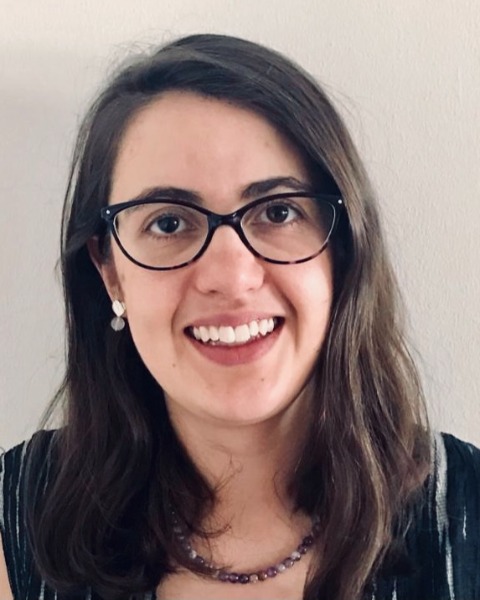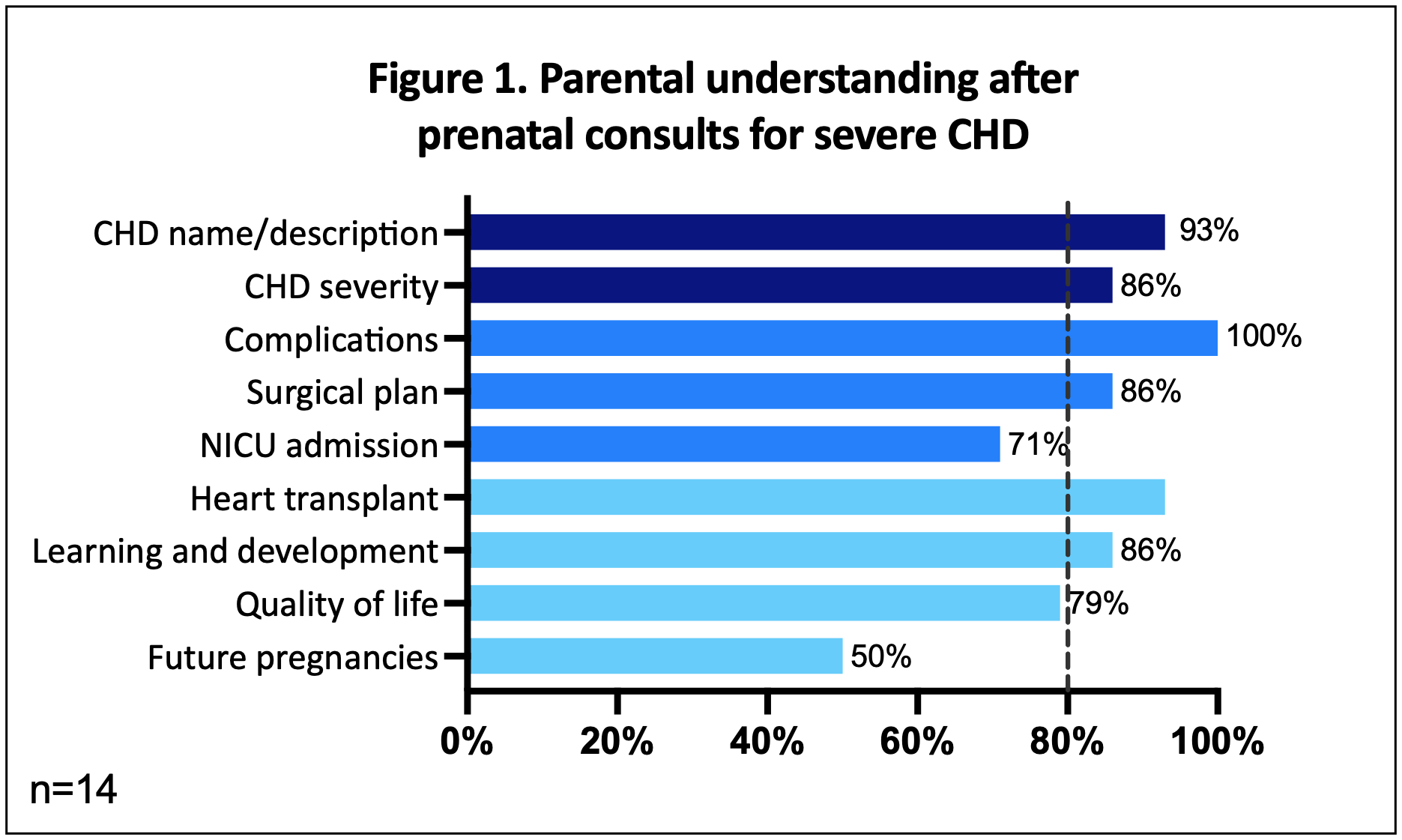Cardiology
Category: Abstract Submission
Cardiology I
168 - Parental Understanding After Prenatal Cardiology Consults for Severe Congenital Heart Disease
Friday, April 22, 2022
6:15 PM - 8:45 PM US MT
Poster Number: 168
Publication Number: 168.101
Publication Number: 168.101
Chantal Angueyra, Columbia University Vagelos College of Physicians and Surgeons, New York, NY, United States; Adriana Montes Gil, Columbia University Vagelos College of Physicians and Surgeons, New York, NY, United States; Nicole T. Stanford, New York Presbyterian- Columbia, Hoboken, NJ, United States; Julie Glickstein, Columbia University / Morgan Stanley Childrens Hospital of NY Presbyterian, NY, NY, United States; Kathleen G. Brennan, Columbia University Vagelos College of Physicians and Surgeons, New York, NY, United States

Chantal Angueyra, MD
Neonatology Fellow
Columbia University Vagelos College of Physicians and Surgeons
NewYork-Presbyterian/Columbia University Medical Center
New York, New York, United States
Presenting Author(s)
Background: Congenital heart disease (CHD) is the most common congenital malformation worldwide and usually requires lifelong care. Early detection leads to improved care of children with CHD. Prenatal cardiology consults provide an opportunity to educate parents on results of fetal echocardiogram and help them prepare for their future with their child. Limited data exists to assess successful knowledge transfer from pediatric cardiologists to parents during prenatal consults.
Objective: This is a prospective questionnaire based descriptive study at a single tertiary referral center aiming to assess parental understanding and satisfaction after prenatal consult with a pediatric cardiologist for severe CHD.
Design/Methods: After prenatal consults, surveys were administered to consenting pediatric cardiologists and parents receiving a diagnosis of single ventricle lesion or Tetralogy of Fallot. Surveys assessed transfer of knowledge, perceived parental understanding, satisfaction with the consult, and anxiety scores.
Results: Demographic characteristics of a preliminary cohort of parents are shown in Table 1. Preliminary data (Fig 1) from 14 parents expecting an infant with severe CHD and their pediatric cardiologists showed that most parents (93%, n=13) understood the name and description of the heart lesion. However, 21 % of parents (n=3) did not understand that their infant would require neonatal admission immediately after birth and 14% of parents (n=2) did not understand the surgical plan during the neonatal period. Additionally, 21% of parents (n=3) had not considered that the quality of life of their infant could be impacted by their infant’s CHD; although all parents expecting an infant with severe CHD understood the risk for some short and long-term complications associated with their infant’s CHD. Lastly, 50% of parents (n=7) did not understand their higher risk for fetal CHD in future pregnancies.
Despite these knowledge deficits, most parents and cardiologists (93% and 86%, respectively) assessed parental understanding as good and all reported satisfaction with prenatal consults (Fig 2). All parents thought the amount of information was “just right” and felt they had enough time to ask questions. Conclusion(s): Despite overall satisfaction and comprehension reported by both parents and physicians, a substantial number of parents did not fully understand information provided during prenatal consults for Tetralogy of Fallot and single ventricle lesions. Further work is needed to improve knowledge transfer to parents expecting infants with severe CHD during prenatal consults with pediatric cardiologists.
CVChantal Angueyra - CV.pdf
Figure 1. Parental understanding after prenatal consults for severe CHD Figure 1. Parental understanding after prenatal consults for severe CHD
Figure 1. Parental understanding after prenatal consults for severe CHD
Objective: This is a prospective questionnaire based descriptive study at a single tertiary referral center aiming to assess parental understanding and satisfaction after prenatal consult with a pediatric cardiologist for severe CHD.
Design/Methods: After prenatal consults, surveys were administered to consenting pediatric cardiologists and parents receiving a diagnosis of single ventricle lesion or Tetralogy of Fallot. Surveys assessed transfer of knowledge, perceived parental understanding, satisfaction with the consult, and anxiety scores.
Results: Demographic characteristics of a preliminary cohort of parents are shown in Table 1. Preliminary data (Fig 1) from 14 parents expecting an infant with severe CHD and their pediatric cardiologists showed that most parents (93%, n=13) understood the name and description of the heart lesion. However, 21 % of parents (n=3) did not understand that their infant would require neonatal admission immediately after birth and 14% of parents (n=2) did not understand the surgical plan during the neonatal period. Additionally, 21% of parents (n=3) had not considered that the quality of life of their infant could be impacted by their infant’s CHD; although all parents expecting an infant with severe CHD understood the risk for some short and long-term complications associated with their infant’s CHD. Lastly, 50% of parents (n=7) did not understand their higher risk for fetal CHD in future pregnancies.
Despite these knowledge deficits, most parents and cardiologists (93% and 86%, respectively) assessed parental understanding as good and all reported satisfaction with prenatal consults (Fig 2). All parents thought the amount of information was “just right” and felt they had enough time to ask questions. Conclusion(s): Despite overall satisfaction and comprehension reported by both parents and physicians, a substantial number of parents did not fully understand information provided during prenatal consults for Tetralogy of Fallot and single ventricle lesions. Further work is needed to improve knowledge transfer to parents expecting infants with severe CHD during prenatal consults with pediatric cardiologists.
CVChantal Angueyra - CV.pdf
Figure 1. Parental understanding after prenatal consults for severe CHD
 Figure 1. Parental understanding after prenatal consults for severe CHD
Figure 1. Parental understanding after prenatal consults for severe CHD